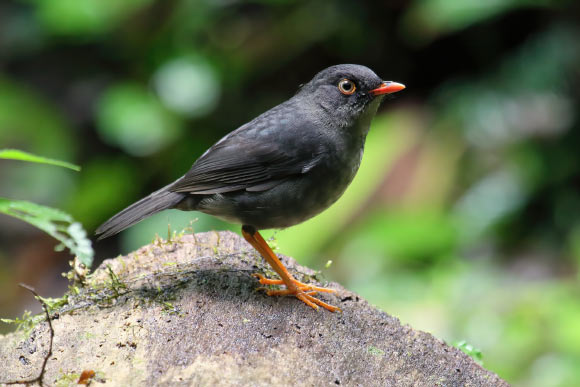Catharus fuscater complex taxonomy
Unmasking the Hidden World of Catharus Fuscater Complex Taxonomy in Panama
Catharus fuscater complex taxonomy unravels the avian mysteries of Central and South America‘s montane songbirds.
Unveiling the Cryptic Bird Species of Panama: Beyond Taxonomy
In the realm of avian wonders, a new chapter unfolds in the rich tapestry of Central and South America’s biodiversity. Ornithologists from prestigious institutions – Drexel University, the Delaware Museum of Nature & Science, and Burke Museum of Natural History and Culture – have embarked on a groundbreaking journey to redefine our understanding of the Catharus fuscater complex. These songbirds, hidden within the misty mountain rainforests, are captivating creatures with a story that goes far beyond their musical whistles.
Genetic Insights into Speciation
One of the primary revelations in their research is the role of geographic barriers in the process of speciation. Genetic data have consistently pointed to the significance of these natural partitions in driving the evolution of distinct bird species. The story of the Catharus fuscater complex is one of adaptation to diverse landscapes and microclimates, separated by deep river valleys and imposing mountain chains. This genetic revelation casts a spotlight on the intricate dance of evolution in these avian populations, teetering on the edge of distinct species and subspecies.
The Complex Polytypic Bird Species
The Neotropical highlands are home to an astonishing array of polytypic bird species. The term ‘polytypic’ implies that these species exhibit different forms, or phenotypes, across their various populations. For these songbirds, it’s not just about subtle variations; it’s about the potential emergence of entirely new species. As they inhabit multiple mountain chains isolated by deep valleys, these birds are prone to developing divergent phenotypes.
Conservation Imperative
Beyond the realm of academia, this research holds profound implications for the conservation of avian biodiversity. Describing and classifying the diversity within the Catharus fuscater complex isn’t merely an academic exercise; it’s a crucial step in safeguarding the future of these remarkable creatures. The implications reach far and wide, as preserving this biodiversity is essential for maintaining the delicate balance of the ecosystem in which they reside.
The Nuances of Integrative Taxonomy
The journey of integrative taxonomy, as our lead author Matthew Halley and his colleagues have noted, is anything but straightforward. It’s a path fraught with ideological conflicts over how we define species and apply those definitions. Integrative taxonomy brings together various disciplines and data sources to provide a more holistic view of these avian populations. It’s an approach that is often fraught with debate, reflecting the complexities of the natural world.
The Slaty-Backed Nightingale-Thrush
As we delve deeper into the world of the Catharus fuscater complex, we encounter the enigmatic slaty-backed nightingale-thrush. These birds, with their cloud-forest habitats stretching from Costa Rica to Bolivia, are more often heard than seen. Their sweet, musical whistles echo through the misty mountains, leaving an indelible mark on the auditory memory of those who encounter them.
DNA Sequencing and Vocal Revelations
To truly understand the intricacies of these populations, the scientists embarked on an ambitious journey of DNA sequencing, studying physical features, and analyzing vocalizations. Through these methods, they unveiled ten genetically distinct populations that have evolved independently over multiple glacial cycles. The molecular clock suggests that most lineages diverged during the Early Pleistocene and Late Pliocene, a fascinating window into their evolutionary history.
Songs That Define Species
Among the many intriguing discoveries, the acoustic structure of their calls stands out. These birds exhibit distinct call types, believed to be innately acquired. However, it’s in the subtle differences among populations in song structure that a wealth of knowledge lies. The ability to learn and adapt through song has played a pivotal role in their evolution.
A Taxonomic Renaissance
The crux of this research lies in the proposal of a taxonomic revision. The team has redefined the Catharus fuscater complex, recognizing seven distinct species, including the Darién nightingale-thrush, a newly described species from eastern Panama. Four subspecies, including Catharus opertaneus tenebris and Catharus berlepschi nebulus, are also added to the annals of avian taxonomy.
A Step Towards Conservation and Understanding
As we close this chapter on the cryptic bird species of Panama, one thing becomes evident: understanding these species is not merely a scientific endeavor but a crucial step in conserving the rich avian biodiversity of Central and South America. In a world grappling with environmental challenges, this research beckons us to embrace a deeper understanding of the intricacies of nature.
This journey into the heart of taxonomy and avian diversity invites us all to ponder the boundaries of species and the hidden stories of these remarkable birds. It is a testament to the ever-evolving tapestry of life on our planet, one that we must cherish and protect.
Join the conversation and share your thoughts on this remarkable journey of discovery in the comments below. How can our newfound understanding of these bird species impact conservation efforts? Let your voice be heard as we continue to unravel the mysteries of the natural world.
Unmasking the Hidden World of Catharus Fuscater Complex Taxonomy in Panama
Discover the fascinating world of bird species with our recommended bird watching equipment. As you’ve read about the newly identified bird species in Panama, your interest in avian diversity is already piqued. Whether you’re an aspiring ornithologist or a nature enthusiast, having the right gear can enhance your bird-watching experience.
Imagine venturing into the mountain rainforests of Central and South America, much like the intrepid researchers who unveiled these new species. To fully appreciate these magnificent creatures, consider investing in quality binoculars that will help you spot them, even when they’re shy and elusive. Additionally, field guides specific to the region can provide valuable insights into the birds’ plumage, calls, and behaviors, enriching your understanding of their diversity.
In our product section, we’ve curated a selection of bird watching equipment, from binoculars to field guides, to complement your passion for avian exploration. Get ready to embark on your bird-watching journey and experience the wonders of these newly discovered species, all while contributing to their conservation efforts. Your next adventure awaits!
Shop Products On Amazon
Products From Amazon
Shop Products on Ebay
Trending Similar Stories in the News
Cryptic New Bird Species Identified in Panama - Sci.News
October 16, 2023 - Sci.NewsCryptic New Bird Species Identified in Panama Sci.News...
Trending Videos of Catharus fuscater complex taxonomy
Basic Ornithology: Avian Diversity and Classification
Discover how important avian taxonomy is to ornithological research and the potential pitfalls in the misclassification of birds.
Bird Taxonomy Explained | Part 1: Domain to Class | BIRDING TODAY SPECIAL
In this special three-part Birding Today video series, we'll be exploring exactly how birds are arranged or classified into different ...
Similar Posts, Popular Now
Israel-Hamas crisis updates
Gaza City Evacuation Dilemma
LinkedIn Layoffs Update
Playgirl Magazine Fraud Case
Distinguished Longview High Alumni





















GIPHY App Key not set. Please check settings